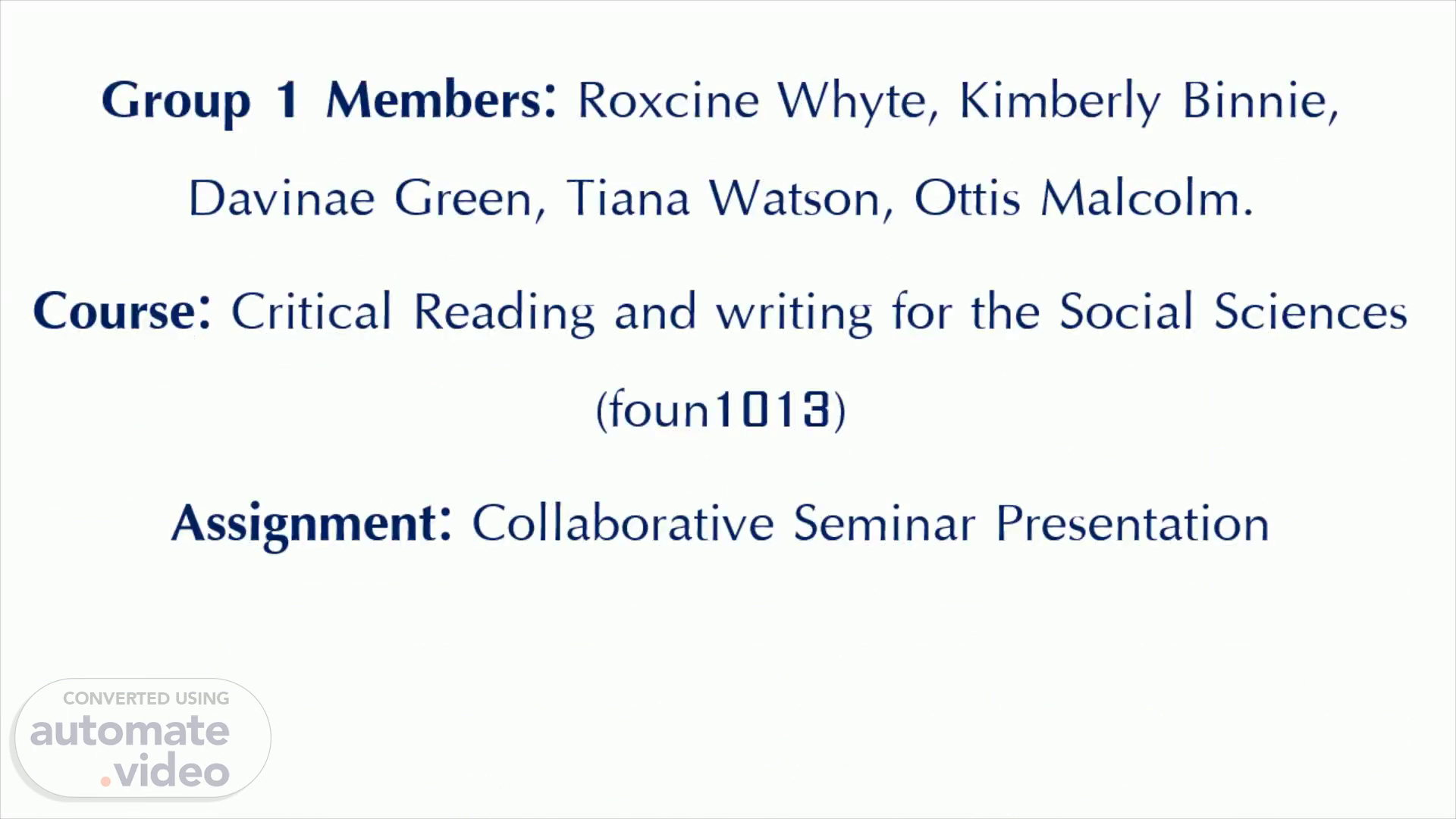
PowerPoint Presentation
Scene 1 (0s)
Group 1 Members: Roxcine Whyte, Kimberly Binnie, Davinae Green, Tiana Watson, Ottis Malcolm. Course: Critical Reading and writing for the Social Sciences (foun1013) Assignment: Collaborative Seminar Presentation.
Scene 2 (11s)
Broad Topic: Issues faced by young adults. Narrowed Topic: Issues faced by first generation tertiary level students in Jamaica. Group Model: Representatives of the guidance and counselling unit from the Ministry of Education. Guiding Theory/Concept/Principle: Compared to students with college-educated parents, first-generation college students report receiving less assistance in preparing for the post secondary environment (Choy, 2001), feeling less supported while attending college (Longwell-Grice & Longwell-Grice, 2008), and lacking a sense of belonging to the institution they attend (Choy, 2001)..
Scene 3 (22s)
Introduction A 2010 study by the Department of Education found that 50 percent of the college population is made up of first-generation students, or those whose parents did not receive education beyond a high school diploma (lynch,2016). First generation college student is a term used to describe a student whose parents did not complete a four-year college or university degree (Marquette University,2021). Hence, if neither parents attended college, or if they took some classes but didn’t graduate, when their offspring attends college, they would be considered a first-generation college student. First generation college students have a unique ability to change the course of lifestyle for themselves and extended family and completing a university degree can assist to have this done. The issues faced by first generation tertiary level students in Jamaica include challenges with financing tertiary education, minimal support from home and lack of knowledge about the college experience..
Scene 5 (1m 9s)
See the source image. Finance.
Scene 6 (1m 15s)
Challenges with financing tertiary education Tertiary Education is an expensive investment. Depending on the chosen course of a study a student could pay an average of $1,038,161 -$5,314,572 to attain a 4year degree in Jamaica. (JTEC2017). First-generation students are likely to be from a low-income family and are likely to be working full time and taking classes part time (Nomi, 2005 and Darling and Smith, 2007)..
Scene 7 (1m 37s)
Challenges with financing tertiary education Financial aid is essential for many first-generation students to pursue tertiary education (Nomi, 2005). Studies have shown that financial burdens are the primary reason first-gen students leave school, with 33 percent of them dropping out within 3 years(United Post News, 2021)..
Scene 8 (1m 53s)
Challenges with financing tertiary education The Covid19 effect on first-generation tertiary students.
Scene 9 (2m 1s)
Family Support. A picture containing toy, doll Description automatically generated.
Scene 10 (2m 22s)
Minimal support from home Lack of support from family and friends at home, as compared to their continued generation peer, can make first-generation college students feel abandoned. Shared experience from FGTS.
Scene 11 (3m 47s)
Minimal support from home First generation students are more susceptible to peer pressure ..
Scene 12 (4m 56s)
See the source image. Lack of knowledge about the college experience.
Scene 13 (5m 4s)
Lack of knowledge about the college experience First generation tertiary students(FGTS) face barriers relating to their social life, culture and academics due to lack of knowledge about those experiences in a college environment (London,1989). FGTS do not have family members to relate to with their college experience, so they feel isolated or alone..
Scene 14 (5m 21s)
Lack of knowledge about the college experience FGTS have limited knowledge, they tend to not perform as well as continuing generation students in academics and extra curricular activities(Atherton,2014)..
Scene 15 (5m 33s)
Lack of knowledge about the college experience First-generation tertiary students, or students whose parents have not earned a four-year degree, face unique psychological challenges.
Scene 16 (5m 44s)
Conclusion Finance primary culprit of FGTS failing completion rate. Family isolation/questionable identity Adapting to the college lifestyle Institutions playing a role.
Scene 17 (5m 54s)
References. Lynch, M. (2016). It’s Tough to Trailblaze: Challenges of First-Generation College Students. It’s Tough to Trailblaze: Challenges of First-Generation College Students | Diverse: Issues In Higher Education (diverseeducation.com) Marquette University,(2021). What Does Being a First-Generation Student Mean? https://www.marquette.edu/first-generation-students/about.php Nomi, (2005) & Darling & Smith, (2007). Challenges for First-Generation 2YC Students. Challenges for First-Generation 2YC Students (carleton.edu) Nomi, (2005) . Challenges for First-Generation 2YC Students. Challenges for First-Generation 2YC Students (carleton.edu) United Post News, (2021). Five Ways to Address Challenges First-Generation Students May Face. Five Ways to Address Challenges First-Generation Students May Face - United News Post London, H. B. (1989). Breaking away: A study of first- generation college students and their families. American Journal of Education, 97(2), 144-170 Atherton, C.M. (2014) Journal of College Student Development. Academic Preparedness of First-Generation College Students: Different Perspectives (researchgate.net) , 55(8), 824-829 King, D. (2017) & Johnson, S . (2017) Estimating the cost of Tertiary Education in Jamaica. https://www.capricaribbean.org/sites/default/files/public/documents/report/the_cost_of_tertiary_education.pdf Table 4 pg 11.